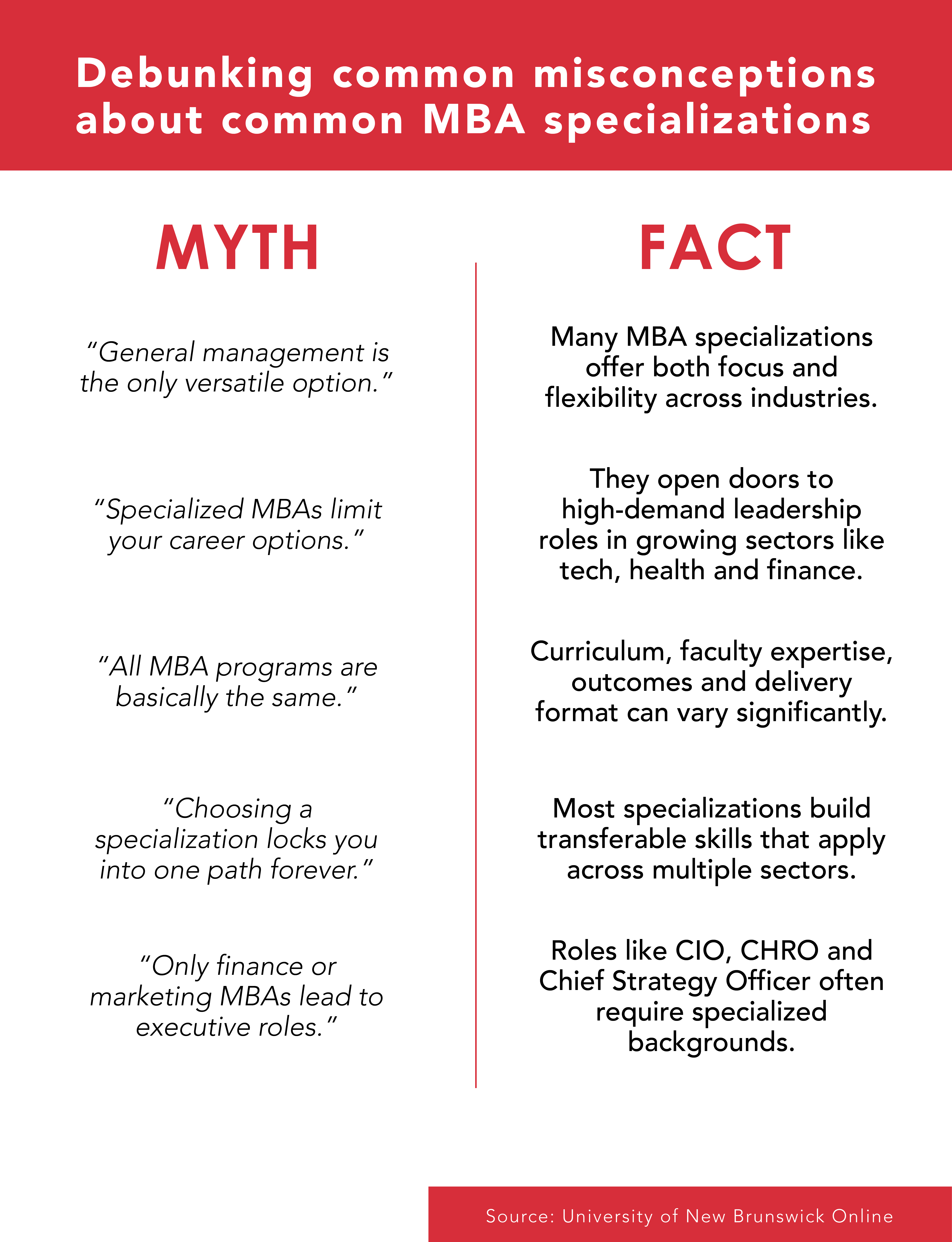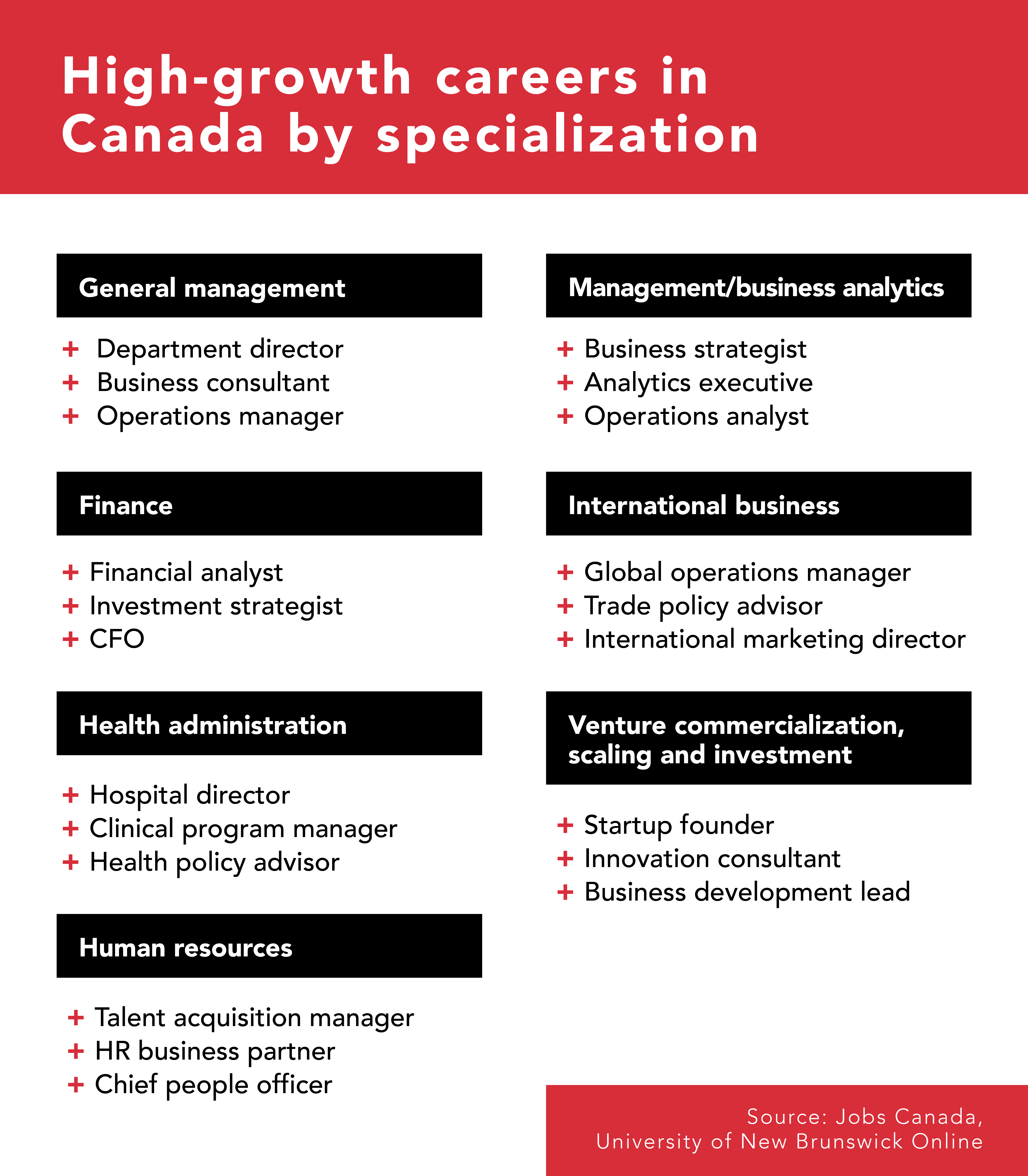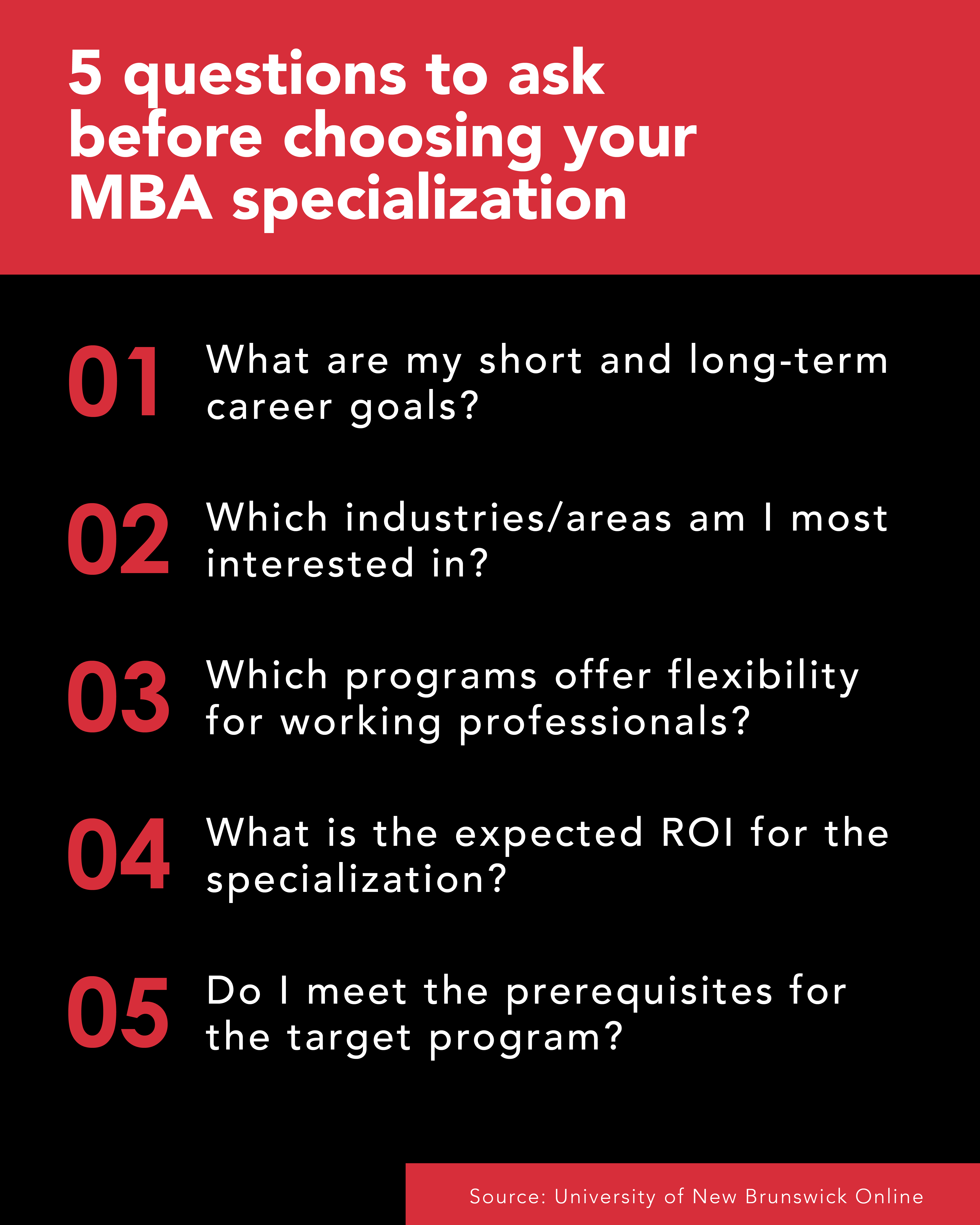Choosing the right Master of Business Administration (MBA) specialization isn’t just about what sounds impressive on a résumé. It’s about setting the stage for your career, aligning your education with your long-term goals and building a future that reflects your interests and strengths.
While all MBA programs provide a solid foundation in business principles, your specialization can open the door to specific industries and leadership pathways.
With options ranging from business analytics to venture commercialization, the right MBA track is the one that fits you. It matches your goals with market demand and gives you the tools to lead, adapt and grow.
Why your MBA specialization matters
Your MBA specialization helps define your professional identity in a competitive job market.
Employers aren’t just hiring someone with a business degree; they’re looking for someone who understands the nuances of their industry. Whether managing corporate finance, leading supply chain management or improving patient care systems, a focused MBA shows you have the training to address complex, real-world challenges.
A targeted specialization also means you’ll be engaging with faculty and peers who are immersed in your chosen field. You’ll gain access to industry-specific mentorship, networks and experiential learning opportunities that can accelerate your advancement and help you carve out your place in the business world.
In short, your specialization helps you stand out. It shapes not only what you learn, but also who you learn from and how you’ll apply that knowledge moving forward.

Understanding the core curriculum vs. specialization tracks
Every MBA student begins by developing a broad foundation. You’ll study business fundamentals like business strategy, project management, finance, marketing, operations and leadership. These core courses ensure you’re equipped to understand how different functions contribute to a business’s success.
The specialization begins after those basics are in place. It usually involves a series of elective courses, often paired with hands-on projects or case studies tailored to your area of focus.
Some MBA programs also offer capstone projects or internships linked directly to your chosen field. This structure allows you to gain both depth and breadth. First, mastering important business tools and skills, then applying them in the context that matters most to your goals.
High-growth MBA specializations to consider
Some specializations are seeing rapid growth in both enrollment and employer demand. This can lead to a competitive advantage amongst business school graduates who choose to focus on a specialized business niche.
Here are some focus areas that are especially relevant in today’s market:
General management and business administration
For those seeking business career flexibility or aiming for executive roles, the business management and administration track offers a strong, comprehensive path. It provides high-level leadership skills, amongst other broad competencies such as business strategy, logistics management, general operations and risk management.
Graduates with this specialization are well-positioned to lead multidisciplinary teams, implement organization-wide change and pursue upper-management opportunities in a variety of sectors.
For instance, the Job Bank of Canada reports that employment prospects for business management positions are rated as "good" to "very good" across most provinces, indicating strong demand for professionals with broad business skills.
Management/business analytics
Management analytics (also known as business analytics) is one of the fastest-growing fields in Canada. This specialization teaches you how to turn data into strategy, helping organizations make informed, high-impact decisions.
According to recent 2025 data, about 12% of MBA graduates have entered the technology sector, which heavily relies on analytics expertise. The Business Development Bank of Canada (BDC) also reports that data analytics is one of the top tech trends influencing Canadian businesses.
Graduates specializing in this field are often prepared for business intelligence, operations, marketing analysis and management consulting roles.
Financial business management
Finance remains one of the most in-demand MBA specializations, offering a strong foundation in corporate finance, financial management, investment strategy and risk management. It also helps students develop quantitative skills and strategic thinking necessary for high-stakes decision-making in both private and public sector institutions.
In Canada, the financial services sector contributed approximately $150 billion to the national GDP, representing 7.5% of total economic output. This underscores the continued need for professionals with advanced financial acumen and leadership training.
With this information in mind, graduates with a finance specialization often move into roles such as financial analyst, portfolio manager, chief financial officer or investment strategist.
Venture commercialization, scaling and investment
For aspiring entrepreneurs, investors and innovation leaders, a venture commercialization specialization provides the tools to turn ideas into scalable ventures. It delves into capital acquisition, strategic management, product-market fit and business model growth, equipping professionals to navigate the complexities of launching and expanding businesses.
Canada's venture capital landscape highlights the significance of this specialization. In 2024, Canadian venture capital investments reached $7.86 billion across 592 deals, with mega-deals (over $50 million) accounting for 62% of all dollars invested.
With this in mind, this track suits professionals working in venture capital, corporate innovation and economic development roles, offering a deep understanding of startup ecosystems and scalable business models.
International business
In an increasingly globalized world where countries conduct business continuously, understanding how to lead across borders is a valuable skill. International business specializations explore global finance, supply chain management, international marketing research, legal and cultural standpoints and trade policy.
According to Export Development Canada, global trade is rebounding and evolving, creating new opportunities for professionals skilled in international strategy.
This path can prepare students who want to work with multinational firms, enter markets abroad or who want to move further into an international marketing specialization.
Healthcare management or health administration
The Canadian Institute for Health Information reported that total health spending in Canada reached $344 billion, representing 12.2% of GDP. This underscores the fact that the healthcare industry is continuing to grow, and the need for strong leadership is growing with it.
An MBA in healthcare management equips you to lead change in hospitals, clinics or public agencies. It focuses on policy, systems operations, cost management and patient-centred service delivery, preparing graduates for director-level and executive leadership roles.
Human resources
As workplaces adapt to hybrid models, talent shortages and new compliance standards, HR leaders are more important than ever. In fact, Randstad Canada lists HR professionals as among the most in-demand jobs in 2024.
This specialization teaches you how to manage workforce development, organizational change and employee engagement. It’s a strong fit for those passionate about people strategy and workplace culture.
Graduates may pursue roles such as HR manager, talent acquisition lead, compensation analyst or chief of operational management.
Aligning your MBA specialization with your career path
When considering your degree, think beyond the most popular MBA specializations. What do you want your future to look like?
Some MBA students aim for the C-suite. Others want to consult, build a business or transition into a new industry. Each of these paths may call for a different specialization.
In Canada, fields like management analytics, venture commercialization and healthcare leadership are projected to grow. Take time to explore national employment trends using tools like the Job Bank or Statistics Canada. These can provide insight into where demand is rising and where your chosen path may lead.
At the same time, reflect on your strengths and interests. What areas excite you? Where have you already gained experience?
Transferable skills from past roles or interests can often point toward a specialization that fits your career momentum.

What to look for in top business schools offering MBA specializations
Not all MBA programs are created equal. As you research your options, look for schools that offer:
- An MBA curriculum that matches what you want to specialize in
- Accreditation through a recognized body like AACSB or EQUIS
- Strong reputations in Canada and internationally
- Faculty with professional experience in your field
- Industry connections that translate into internships or partnerships
- Flexibility for working professionals, especially through online or part-time study
- Loan, financial aid or scholarship options that may help offset program costs
It’s also important to make sure the school offers the MBA specializations you’re actively considering, and that those specializations include applied, career-ready learning experiences.

Program spotlight: Online MBA specializations at UNB
The University of New Brunswick (UNB) offers two targeted MBA specializations built for career advancement: Management Analytics and Venture Commercialization, Scaling and Investment.
In the Management Analytics stream, students learn how to lead data-driven decision-making across departments. The program covers advanced analytical methods and helps students use data to shape strategy and performance improvement.
The Venture Commercialization, Scaling and Investment stream supports innovators and entrepreneurs looking to launch, fund and grow new ventures. It dives into product development, capital strategy and market analysis; ideal for founders and investment professionals alike.
Both are delivered 100% online and are designed for working professionals who want to grow their skillset without stepping away from their careers. The programs are built on a strong core curriculum in business management, with courses that incorporate real-world applications and insight from experienced faculty.
Invest in your future with UNB’s specialized MBA options
Choosing the right MBA is a strategic investment in the kind of leader you want to become. By aligning your choice with your goals and the needs of today’s job market, you give yourself the best chance to thrive.
UNB’s 100% Online MBA offers two in-demand specializations that support ambitious, forward-thinking professionals ready to take their next step.
Apply now or request information about UNB’s Online MBA in Management Analytics or Venture Commercialization, Scaling and Investment.

